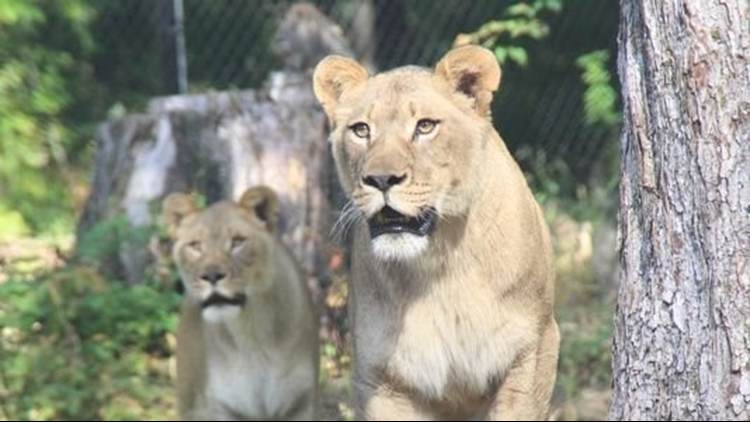Binder Park Zoo visitors someday may see lion, cheetah and snow leopard cubs running and jumping around their exhibits.
Michigan legislators began considering a bill this month that would allow public and private zoos around the state to breed large carnivores.
State Rep. Thomas Albert, R-Kent County, introduced the legislation, House Bill 5778, on April 10. His bill would amend the Large Carnivore Act of 2000, which now prohibits zoos from breeding large carnivores.
"We've been working on this for years," said Leslie Walsh, Binder Park's manager of marketing and development. "We are hopeful that our lawmakers in Lansing will pass House Bill 5778 into law, so zoos in Michigan can work together to preserve endangered species and large carnivores.
"It paves the way for us participate in breeding programs for the large carnivores that we have in our zoo," she added. "There would be baby cheetahs, potentially, lions and snow leopards for our guests to see. People love to see baby animals. It would have a positive impact economically for our zoo and for Battle Creek."
Under the bill, zoos around the state would be able to collaborate to breed lions, tigers, cheetahs, snow leopards and other large carnivores, something they haven't been able to do since legislators approved the current law.
The law — officially known as the Large Carnivore Act 274 of 2000 — was intended to allow only the five Michigan zoos accredited by the Association of Zoos and Aquariums (AZA) to care for, conserve and breed large carnivores such as tigers, lions and bears. It was meant to prohibit those activities by private citizens and roadside zoos or pseudo-sanctuaries, according to the Detroit Zoological Society, which operates the Detroit Zoo.
However, a drafting error made in the numbering of exemptions from prohibitions when the act was filed technically prevents AZA-accredited zoos from doing what they are established to do: conserve and breed endangered species.
The legislature has not yet corrected the law despite years of effort by AZA zoos and others, according to the Society.
“We have been surprised the legislature hasn’t been able to correct this within the parameters of Act (2)74 — that has otherwise worked so well for nearly two decades now, said Executive Director and CEO Ron Kagan. "We realize the current legislature is not responsible for the original typo, but they are the only ones who can correct it.”
Last year, the John Ball Zoo in Grand Rapids had to ship its tigers to another state for breeding purposes, which also played a role in trying to amend the 2000 law, said Brian Sapita, Albert's legislative director.
"Residents in Kent County pay a zoo millage and animals at the John Ball Zoo are both part of the community and an investment, " Albert said. "It is a big loss to the community when treasured animals are shipped to other states.
"The community is paying for the zoo to be there, by sending the tigers that we have to a different state to breed, that‘s hurting an investment that we made," he added.
Albert said Thursday that the bill would allow any accredited zoo in the state — not just those accredited by the Association of Zoos and Aquariums — to breed large carnivores.
The Detroit Zoological Society opposes it, though, because it "expands who can own and breed dangerous predators, lacks oversight and enforcement and adds public costs."
Albert's proposal would establish a three-person board to approve any organization that wishes to breed a large carnivore. Any zoo wishing to have large carnivores would now have to be licensed by the United States Department of Agriculture.
Zoos engaging in breeding would have to house the carnivores in temperatures appropriate for their habitats, have a succession plan for possession of the animals, implement emergency protocols, establish a trained firearms team and meet other requirements, Walsh said.
Binder Park Zoo's lone male lion, Enzi, has two females, Salem and Shelby, to keep him company. The 433-acre zoo also has three female cheetahs: Katie, Madison and Mohini, and one male snow leopard, Raj.
Binder Park may breed lions, cheetahs, snow leopards and possibly other large carnivores if the bill is passed, Walsh said.
House Agriculture Committee members are now reviewing the bill, which must be approved by the House and Senate and signed by Gov. Rick Snyder before it becomes law.
Binder Park officials are encouraging the public to contact their representatives and express support for the legislation.
“Conservation breeding programs are a key part of zoos’ education programs and conservation efforts, which is why passing this legislation is necessary for the success of our zoos,” Albert said. “This legislation will put visitor and animal safety first while preventing bad actors from mistreating animals or putting people at risk.”
USA Today contributed to this report. Contact Battle Creek Enquirer reporter Noe Hernandez at 269-966-0684 or nhernandez@battlecreekenquirer.com.



